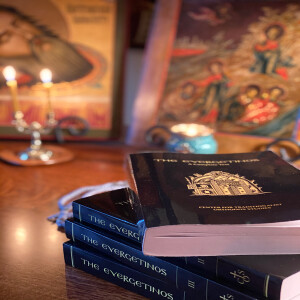“In the deserts of the heart
Let the healing fountain start.”
W.H. Auden (1907-1973)
“The road of cleansing goes through that desert. It shall be named the way of holiness.”
Isaiah 35.8 (LXX)
It has been said that all true renewal within the life of the church comes through the desert fathers, or rather through the embrace of their wisdom. For it is not a worldly wisdom but the wisdom of the gospel, the wisdom of the kingdom that they set before us; not in an abstract fashion but through lived experience.
The desert fathers looked deep within; precisely where Christ directs us to search for the kingdom. It’s not an easy thing to do; to look deep within oneself. Often what begins to emerge can seem ugly and repulsive to us. Sin has not left us untouched. We know its darkness, its suffering, and how it shapes the way we view ourselves, the world, and others.
However, this inward gaze and the ascetic life aids us in seeing with a greater clarity not only our sin but the image of something beautiful beyond imagination; the soul made in the image and likeness of God, transformed and transfigured by his grace. Even in the midst of the struggle, the beauty of God‘s mercy and grace begins to manifest itself, and to reshape the human heart. We begin to understand that the perfection to which we are called is not moral perfection; nor is it the perfection of our natural virtues. It is to share in the very life of God. Christ strength is to become our strength. His virtue is to become our virtue.
It has been said the Christ is the most beautiful of all human beings. In him, we see what we shall be through the grace of God. All that is dark in us, all that becomes an impediment to our ability to love gradually begins to fade away. We no longer cling to the demands of our own will or the pettiness of our ego. We begin to see that in Christ we have all and lack nothing. It is in this realization that we become truly free and capable of love. How beautiful!
---
Text of chat during the group:
00:05:20 FrDavid Abernethy: Starting Hypothesis 42 page 367
00:13:23 FrDavid Abernethy: Starting Hypothesis 42 page 367
00:20:45 John: Kind of reminds me of the Jews who went out to see John the Baptist to ask who he was - though I don't think they were being critical.
00:20:59 Ren Witter: For Father David’s favorite comic about Stylites: https://www.facebook.com/photo.php?fbid=6720341144666823&set=pb.100000730124605.-2207520000.&type=3
00:21:39 John: Reacted to "For Father David’s f..." with 😂
00:51:35 iPhone (61): What page or book are we on Blessings
00:56:07 Rachel: 🤪
00:56:35 Rachel: I love that story.
00:56:37 Ren Witter: Can I say that to the next person who yells at me? “Imitate the Statue” :-D
00:58:46 Rachel: Fun. :/
00:59:06 Rachel: Reacted to "Can I say that to ..." with 👍
00:59:10 iPhone (61): I think we are suppose become like the statue.
01:02:39 Ashley Kaschl: This might be a leap in relation to this analogy with the stone statue but I have been having conversations about Filial Confidence in God. Isaiah 50:7 says, “The Lord God is my help, therefore I am not disgraced; Therefore I have set my face like flint, knowing that I shall not be put to shame.” If the monks in this passage agree to both enter into this life combatting their lower faculties which suggests doing battle against disordered sensibilities, then it also relates to the grace of an inflexible resolve that, no matter what happens to them, all is passing away compared to eternal glory in Christ; they have set their faces like flint against all struggles that may come. I think the goal, then, is to enter into ourselves and do battle so as to become docile and not react in the extremes, to repose ourselves like children in the arms of our Heavenly Father.
01:02:49 Rachel: You cant project it on to Christ. The all innocent and Perfect One.
01:05:16 Rachel: Reacted to "This might be a le..." with ❤️
01:05:33 Ashley Kaschl: Yes! That is what I meant by docile as well. Not a
passivity but one who can be directed or taught as you said 😁🙏
01:07:44 Alexandra K: Reacted to "This might be a leap..." with 👍
01:08:56 John: A bit ironic that flint produces a spark when struck by steel or something similar. However, docility implies that this spark is not anger, but charity.
01:09:08 iPhone (61): Guilty of all these that you mentioned. I am grateful
01:09:15 Ashley Kaschl: Reacted to "A bit ironic that fl…" with 🔥
01:11:16 Alexandra K: Reacted to "A bit ironic that fl..." with 👍
01:12:22 Sheila Applegate: Reacted to "A bit ironic that fl..." with 🔥
01:12:28 Ashley Kaschl: Reacted to "Guilty of all these …" with 💯
01:17:06 Susanna Joy: Thank you, Father. 🙏💖

No comments yet. Be the first to say something!